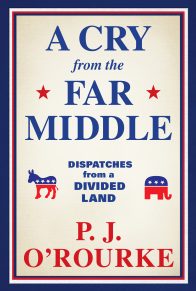It is sometimes thought that Republicans are not environmentally conscious, that we are not concerned about the planet or, as we call it, the outdoors. This is not true. We love the outdoors and carefully instruct our children in its manifold splendors. For example, the son of a Republican friend of mine, when asked by his preschool teacher if he could name the four seasons, proudly said, “Dove, ducks, deer, and quail!”
We Republicans respect and revere the natural world—and all its natural laws and truths we hold to be self-evident. We’re particularly respectful of that aspect of the natural world known as Darwinian selection, whatever you may have heard to the contrary in our churches. Creationism is all well and good on Sunday, but it’s “survival of the most market-oriented” the rest of the week and also in the voting booth.
Thus it was that some Republican friends of mine and I made a pilgrimage to that ecological treasure and living monument to Charles Darwin, the Galpágos Islands.
Several million years ago the Galápagos Islands popped, volcanically, out of the Pacific Ocean. The South American mainland being six hundred miles away and nothing else nearby, each island was a tabula rasa. Various birds, lizards, sea mammals, and seeds blew in and washed up. Biological colonization occurred by dumb luck. Very dumb luck, to judge by how the local critters flap, crawl, and paddle up and present themselves to visiting omnivore bipeds for examination of gustatory potential. Pirates, whalers, and other nonmembers of the World Wildlife Federation had an estimated 100,000 friendly, curious Galápagos giant tortoises for lunch.
Isolation allowed unusual life-forms to flourish. It’s an experiment we all made, when we were single, with Chinese take-out left in the refrigerator for six months. Interesting what happens when all the ecological niches except the shelf the beer is on are empty. General Tso’s chicken can develop into something that fills the whole fridge. Darwin may have noticed this in the fridge of the HMS Beagle. Anyway, when the Beagle arrived in the Galápagos, Darwin—perhaps after a heavy lunch of giant tortoise and beer—formulated his theory of evolution, which may be restated for Republicans as: If you’re slow and edible and I have a gun, the situation will evolve.
Unfortunately, now that the Beagle has been decommissioned, going to the Galápagos in style is something of a problem. For the most part the only way to see the islands is as a tourist on a cruise. There is a kind of tourist who takes this kind of cruise. This tourist loves nature in unnatural ways. An awful prospect presented itself of vegan fare at the captain’s table and conversation about earth being in the balance, never mind that the earth has a mass of 5.97 x 1024 kilograms while Al Gore weighs little more than 250 pounds.
Fortunately, I know a Texan couple with the Texan energy and Republican ingenuity needed to tackle this downside of a Galápagos excursion. George and Laura (not their real names) spent a year juggling the busy schedules of fifty-some pals who adore nature’s glories especially when a covey of them is pointed by our bird dogs. George and Laura then balanced the juggled schedules with the sailing dates of the MS Polaris, owned by that paragon organizer of exotic trips, Lindblad Expeditions. We arrived in the Galápagos not as tourists but as a floating house party. We had booked the whole ship. A vessel that might have flown the Greenpeace unjolly roger now, in effect, hoisted the happy burgee of a yacht. If our dinner seating included members of PETA, we could tell the cruise director, “Throw these vegetarians to the sharks!” Not that Lindblad Expeditions has cruise directors. Lindblad has naturalists with advanced degrees in wildlife biology. Each day these guides took us, by Zodiac boats, to a different Galápagos island. There they delivered talks on Galápagos flora and fauna, giving us important ecology lessons.
On Fernandina Island, our guide said, “The vestigial wings of the flightless cormorant evolved due to a lack of natural predators.” Significant glances were exchanged among my shipmates. Being Republicans, we are natural predators. A nearby flightless cormorant spread stumpy and functionless appendages that looked to make him eligible for membership in the Feather Club for Birds.
“That’s what happens to you without free-market competition,” said Laura.
“The flightless cormorant is endemic to the Galápagos islands of Fernandina and Isabela,” said our guide. (“Endemic” is wildlife biologist talk for “doesn’t get out much” or “stuck there.”)
“Notice how close we can get to the birds, even when they are nesting,” our guide continued. “This is because they have no experience with humans; they are truly wild.”
“Of course!” said a Dallas lawyer. “I should have realized that a long time ago—in my junior year of college—wild equals stupid.”
It was an insight that dominated shipboard sundowner gin and tonic chatter.
“Into the stupid blue yonder.”
“Call of the stupid.”
“Stupid Kingdom.”
“Stupid thing, you make my heart sing, you make everything . . . stupid.”
The Galápagos are an Ecuadorian national park and a UNESCO World Heritage Site. Strict preservation of the pristine stupidity of the wilderness allowed us to experience a close communion with the animal world that you can’t get even from Rover, no matter how stupid he is. The endemic waved albatross let us in on its every Dr. Phil moment. The birds mate for life, then immediately separate. They go off alone for months at sea and return to Española Island in the Galápagos to breed. But before the albatross husband gets back together with his albatross wife, he rapes the other wives. There is an elaborate reconciliation with squawking and slapping of beaks ending in mutual embrace—perfect for daytime bird television. They have an egg, probably to strengthen the relationship. Then they take turns sitting on it for up to a week at a time. When Al Junior is hatched he gets as much as four and a half pounds of food regurgitated down his throat in a single feeding. By five months the chick weighs more than its parents. Feminist issues, family leave, childhood obesity—on Española we had found a place where Hillary Clinton truly could make a difference.
Speaking of objects of ridicule, there is the foolishly waddling, risibly yclept blue-footed booby. The boobies’ webbed toes are as funny-colored as a UN flag. Their mating dance is a disco polka. They give each other pebbles.
Boobies share their inshore feeding waters with the noble frigate bird. The frigate birds soar and loop on vast scimitar wings and grace the sky with acrobatics. It’s impossible not to admire the one and disparage the other, until it’s time for work. The boobies are skilled divers. Plunging from a hundred feet in the air into water sometimes only eighteen inches deep, they harvest whole schools of fish. Then the frigate birds grab the boobies by their tails in midair and bite them and shake them until the boobies cough up their food. “Back on the ground,” said our guide, “the male frigate birds have a very large red throat pouch which they puff full of air to attract . . .”
“Voters, I’ll bet,” said a woman who’d survived a political appointment in the Bush pére administration. “Observe the frigate birds,” she said, “and you know everything you need to know about Democratic presidential candidates.”
“The blue-footed boobies need re-branding,” said a marketing consultant from New York. “Those feet—they’ve a skateboard sneaker franchise crying out for a licensing deal.”
“Look,” said our guide, “a lava gull.” He pointed to a bird that was more like a dove than the airborne sanitation engineer that we call a gull. “They’re very rare,” said the guide, “Maybe only four hundred in the world.”
“They must be delicious,” said one of our more avid bird-hunters. Our shipboard party was of the opinion that extinction probably has as much to do with flavor as with pollution or climate change. Whenever a new creature was spotted, our first question was, “How do they taste?”
It took all week to get one of our guides to admit that he knew how giant tortoise tastes. Not personally, of course, but he was born in the Galápagos and “a long, long time ago my parents had some.”
“Well?” we said.
“Good.”
The food on the Polaris was good, too, albeit lacking in turtle chops and breast of lava gull. The crew was cheerful. The cabins were not too boat-size. And every night the Lindblad guides delivered further informative talks on Galápagos flora and fauna, giving us more important ecology lessons.
Some of us preferred to spend the evenings on the fantail in consultation with Professor Dewar’s and Dr. Monte Cristo. Inside, a Lindblad guide was explaining how young the Galápagos Islands are, in geological time. Outside, George was suggesting that setting our watches to geological time could lessen stress and keep us young. “I’ll get back to you on that right away—in geological time.”
Mornings we snorkeled—an abrupt and effective hangover cure. Commercial fishing is banned in the Galápagos. The island waters are a fish Calcutta. So many giant angelfish appeared that I felt like the bubbling deep-sea diver in the aquarium of a pet store that just can’t make a sale. Tiny, silver pizza-toppers swam in schools the size of Little Italy. Parrot fish, damselfish, and wrasses exhibited the same obliviousness to our presence as the wave albatross and, mercifully, so did the white-tipped sharks (who’d already gorged themselves, perhaps, on vegetarians). Manta rays in watery flight winged by and had a look, as did gringo fish, so called by the locals because they’re pale in the water and turn bright red in the sun.
Back in the Zodiac (and rather pink ourselves) we were told by our guide, “You’ll notice the puffer fish is particularly friendly—because it is poisonous.”
“Typical,” said a Houston hostess who has to endure a lot of political fund-raisers.
Young sea lions came out and dived with us. They did barrel rolls around our torsos, nibbled our swim fins, and played tug-of-war with the Zodiac’s lifesaver ring. They are aqua-puppies. On the lava shore of Santiago Island we saw a little fellow who’d just been born. Like a well-bred American Kennel Club dam, his mother allowed us an up-close look. No one asked, “How do they taste?”
At that evening’s fantail colloquium, fly-casters asked bird-hunters, “Is there a reason we couldn’t train sea lions to flush bonefish in the Florida Keys?”
The adult male sea lions, the bulls, wouldn’t be much use. They spend their lives guarding a particular stretch of beach from sea lion pool boys, sea lion UPS drivers, etc. Meanwhile their wives come and go as they please. “I tell my clients,” said the Dallas lawyer, “just give her the house.”
Not that our tour group meant to introduce collars and kennels or animal divorce courts into the Galápagos. There’s been enough disturbance of nature’s balance. Feral goats, let loose by settlers from the mainland, ate the giant tortoise habitat. On the smaller islands the goats have now cashed in their 401(k)s, but Santiago still has tens of thousands. The Charles Darwin Foundation, the World Wide Fund for Nature, and other organizations are spending millions on goat eradication. We volunteered to do it for free. Well, not exactly for free. But give us the goat-hunting rights and we’d sell trips to the Galápagos to wealthy American sportsmen offering unlimited trophy goat opportunities. The Lindblad people looked dubious.
The Galápagos Islands do need assistance, however. The government of Ecuador does its best but is hampered by being, frankly, the government of Ecuador. Send lawyers, guns, and money. Actually, our group had the lawyers and guns. Send just the money to donations@darwinfoundation.org. Think of those giant tortoises. They date back to the age of the dinosaurs. They have movie-star good looks. (E.T. was a huge hit.) And there’s something about the giant tortoises that’s just so . . . so . . . “Extinctable,” said Laura. “When life-forms that had more on the ball than dinosaurs arrived, they thought, ‘It comes in its own casserole dish!’”
On Santa Cruz Island we saw a few tortoises in the wild. They’re easy enough to find, being in exactly the same place they were when the last Lindblad tour came through. Top speed is approximately zero. And we saw a turtle herd at the Charles Darwin Biological Research Station, where a tortoise dating service is attempting to reestablish various subspecies and repopulate the Galápagos. According to research station literature, “When hormonal levels are running high, male tortoises have even been known to try mounting rocks . . .”
“Ugggh, men!” said the women in our group.
“Mating is very vigorous,” the research station biologist said. He pointed to the last male of the pinta subspecies. “We knew that this one was sexually dysfunctional when he copulated for only twenty minutes.”
“Ooooo, turtles!” said the women.
And then there is the pure beauty of nature in the Galápagos. One afternoon, steaming between islands, we encountered a pod of 1,000 dolphins, jumping in undulations, Baryshnikoving above the waves. Even the Buchanan Republicans among us held their breath in awe and thereby briefly honored the Kyoto Protocol on climate change. Out beyond the dolphins was a basking sperm whale, such a magnificent creature that, we all concurred, harming it would be as bad as seeing a “SAVE THE WHALES” bumper sticker on your congressman’s car.
“This trip really is educational,” said the Dallas lawyer. “Suddenly I want to read Moby-Dick, and not the Cliff Notes, either.”
“And forty years after the fact, I finally understand my statistics class,” said George. He was referring to the penguins and flamingos we’d seen the previous day. This is the only place on earth that has both. The Galápagos are on the equator, so they’re tropical, but the icy Humboldt Current cools the air, forming a dense foggy mist called a garía that gets everything cold and soaking wet even though the Galápagos are desert islands. The climate is perfect—if you average it. Confusing “average” with “median,” as we all did in statistics class, penguins and flamingos both arrived.
I think we were also supposed to be learning something from the famous Darwin finches. But, to tell the truth, they’re small, drab, and boring. It is a mark of Darwin’s genius that he noticed them at all. Then, by observing the various evolutionary modifications in their little beaks, Darwin somehow discovered that men are descended from monkeys, although he would have known this already if he’d asked the men’s wives.
Which goes to show that not all lessons in ecology are edifying. The marine iguana, for example. Washing ashore from the mainland, it learned to go with the flow. It became the only seagoing lizard. It eats nothing but algae. Here is the lizard version of moving to Humboldt County, California, growing your own vegetables, and weaving your clothes from hemp. Marine iguanas are as dull as folk songs and as ugly as unglazed pottery. They spend all day lying on top of each other in big iguana group gropes.
Looking at the marine iguanas, the Dallas lawyer said to his wife, “Honey, do you think we should have left the teenagers home by themselves?”













